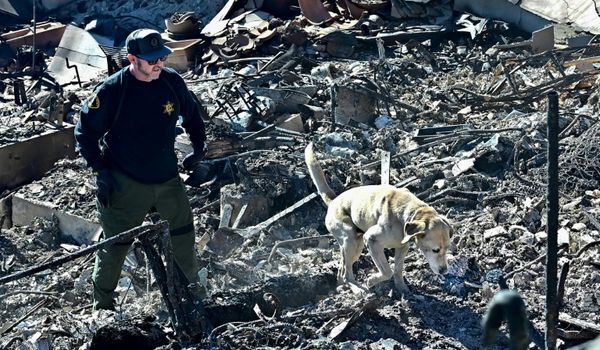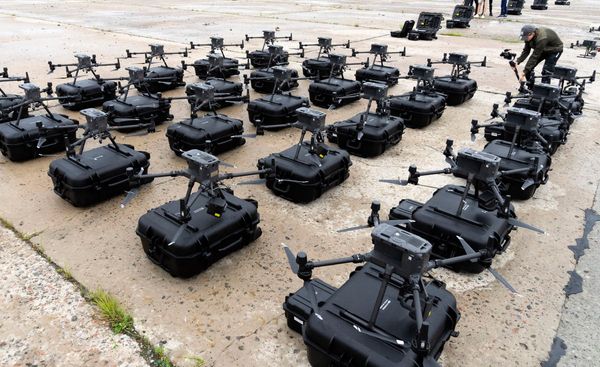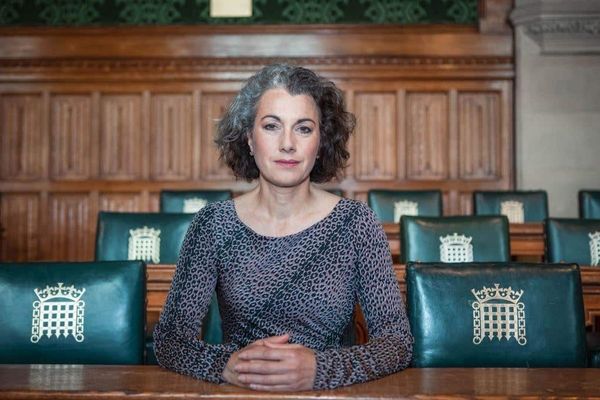
An eleventh-hour drawdown of U.S. diplomatic personnel in Iraq is leaving a skeleton crew of full-time American aid officials, in addition to locally hired staff, to monitor nearly $1 billion worth of foreign aid programs, current and former officials told Foreign Policy.
Earlier this month, Secretary of State Mike Pompeo moved forward with plans to withdraw dozens of diplomats at the U.S. Embassy in Baghdad, officials and congressional aides said, a preemptive safety measure amid potential security threats tied to the one-year anniversary of the U.S. killing of a top Iranian military commander last January.
The decision roughly halved both the number of U.S. diplomats and also that of full-time U.S. foreign aid officials at the embassy, current and former officials as well as congressional aides familiar with the matter said. The move, they said, will leave only four full-time U.S. Agency for International Development (USAID) staffers in place, in addition to locally hired employees, at the embassy to monitor hundreds of millions of taxpayer dollars’ worth of foreign aid programs.
Former officials and humanitarian workers, speaking on condition of anonymity, said it would be difficult, if not impossible, for such a limited staff to ensure so much aid funding is properly implemented without mismanagement or graft. While some described the decision as quickly reversible, it comes amid a broader, last-minute drawdown of military and diplomatic personnel from Iraq in the final weeks of Donald Trump’s presidency that some in Congress fear could undermine Iraq’s stability and open a vacuum for Iran and its proxies to gain even more influence in the country.
“If Iran wants us out of Iraq and we are leaving under pressure, we are giving them just what they want,” said a Senate aide familiar with the matter.
The drawdown also reflected mounting frustration in Congress over the administration’s handling of the Middle East. Members and staffers on the Senate Foreign Relations Committee and House Foreign Affairs Committee had been requesting briefings on staffing levels at the U.S. Embassy in Baghdad since September and October. Administration officials did not inform Congress about the decision before the news was published in advance, in stories from Politico and the Washington Post, according to several congressional aides familiar with the matter.
In a statement to Foreign Policy, acting USAID spokesperson Pooja Jhunjhunwala would not comment on staff numbers, citing security concerns, but said that the agency “continually adjusts its posture at Embassies and Consulates throughout the world” depending on the mission, local security, and holidays. Jhunjhunwala said the relocation of USAID staff would not impact local Iraqi employees, who are on telework during the COVID-19 pandemic. The agency has also brought in third-party monitors on contract to attempt to ensure accountability for its projects. “The proper oversight of U.S. taxpayer funds spent on foreign development is paramount to [USAID],” she added.
A State Department spokesperson also declined to comment specifically on the movement of staff and did not address questions on the criticisms from Capitol Hill. The spokesperson said that ensuring the safety and security of U.S. citizens, government personnel, and facilities “remains our highest priority.” The spokesperson added that the U.S. ambassador to Iraq, Matthew Tueller, remains in Iraq and the embassy in Baghdad continues to operate.
Democrats in Congress said the move is another parting shot from the Trump administration that could make life more difficult for President-elect Joe Biden.
“This drawdown is another example of President Trump’s reckless foreign policy that undermines our diplomatic and humanitarian engagement with the world and creates unintended consequences that the next administration will have to address,” Democratic Rep. Ted Deutch, who chairs the Middle East subpanel on the House Foreign Affairs Committee, told Foreign Policy in a statement. “The Iraqi people face an array of challenges, and a fully staffed and appropriately protected, American mission is vital to assist efforts to counter ISIS and other forms of malign influence, and help Iraq become a more resilient, independent, and democratic country.”
When State Department officials did brief lawmakers on the issue in early December, they described the departures from the embassy as a “temporary and readily reversible” decision, linked to heightened threats to U.S. government personnel and troops in Iraq from Iran, according to the Senate aide.
This is the second wave of personnel drawdowns at the U.S. Embassy in Baghdad in the past year. The Trump administration ordered the departure of diplomatic and aid personnel last year that dramatically reduced the size of the staff and left in place less than two dozen USAID officials.
According to a Senate aide familiar with the matter, the new order will leave less 100 full time employees.
“USAID plays a valuable role in the overall U.S. missions in Syria and Iraq. Their support to the local population brings goodwill toward the United States, and our continued presence there,” said Mick Mulroy, a former top Middle East official at the Pentagon during the Trump administration and now an ABC News national security analyst. “I do not know if the reports of a departure or draw down of USAID are true, [but] I hope that our ambassador, country team, and the commander of [the U.S.-led mission against the Islamic State] can weigh in on this decision and the impact it may have on their operations.”
The United States earmarked about $960 million worth of aid to Iraq in fiscal year 2019 and $197 million in fiscal year 2020 so far, according to data from USAID.
The diplomatic and aid shrinkage in Iraq coincides with a last-minute military pullback from the region. During Trump’s last weeks in office, the outgoing administration appears to be attempting to downshift its campaign to counter the Islamic State, with the Defense Department reducing U.S. troops in Iraq and Afghanistan and the departure of top officials coordinating those campaigns. Following a presidential directive, the U.S. military will cut the number of troops in Iraq from 3,000 to 2,500 by Jan. 15—five days before Biden will be inaugurated.
The response to the situation in Iraq has also been hampered by personnel turnover and the White House’s desire to declare the Islamic State defeated, even as the group’s attacks continue. Christopher Maier, an Obama administration holdover who led the anti-Islamic State task force at the Pentagon, was ousted weeks ago after losing trust with Trump allies who now dominate the agency’s powerful policy shop. The special envoy for Syria and the anti-Islamic State coalition, Jim Jeffrey, also left the administration last month.
But the fall of the Islamic State’s territorial empire, which spanned 34,000 square miles into Syria and included about 40 percent of Iraq during the height of the self-declared caliphate, has done little to lessen Iraq’s crushing bills to rebuild the country, embroiled in near-constant upheaval since the 2003 U.S. invasion that led to the ouster of dictator Saddam Hussein.
There are 1.4 million people still internally displaced and 4.1 million people in need of humanitarian assistance in Iraq, according to the United Nations, which remains nearly $60 million short of funding for the humanitarian response in the country.
The embattled Iraqi government, which faced anti-corruption protests last year that forced the ouster of then-Prime Minister Adil Abdul-Mahdi, has pledged to devalue the nation’s currency in a draft budget that leaked this week, raising concern from workers who will now have to make do with even less.
Senior diplomatic correspondent Colum Lynch contributed to this report.







